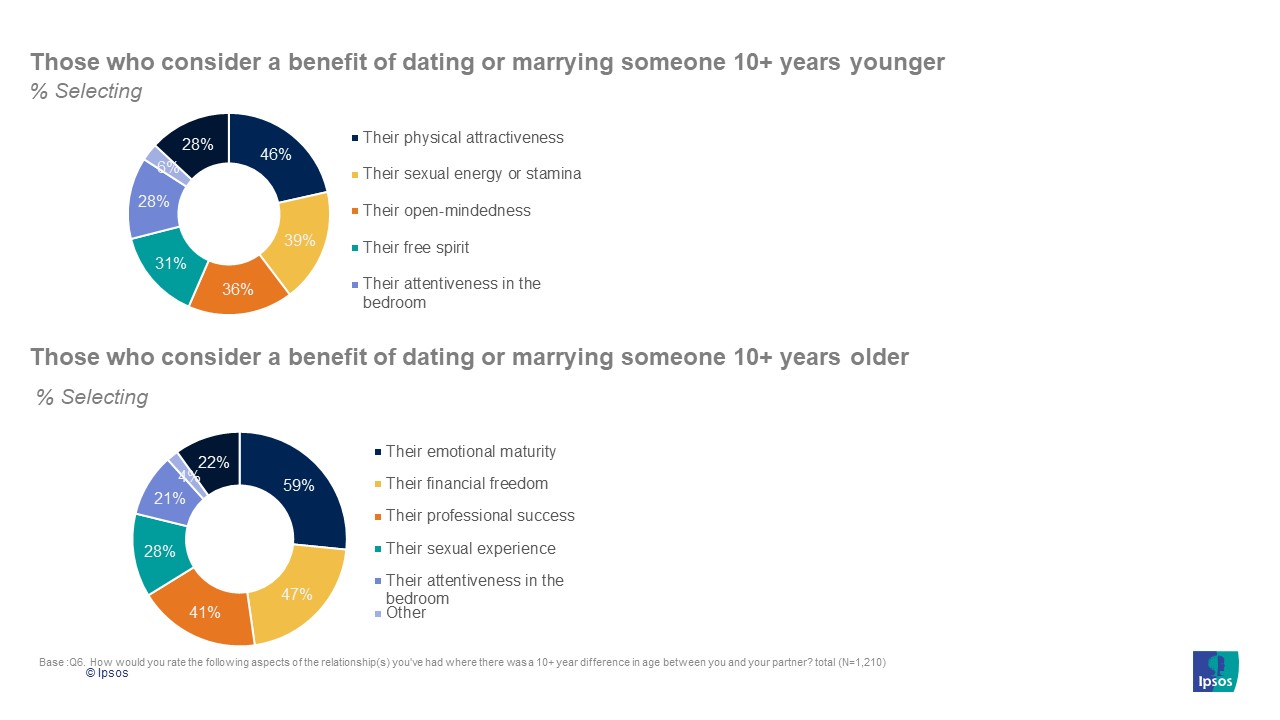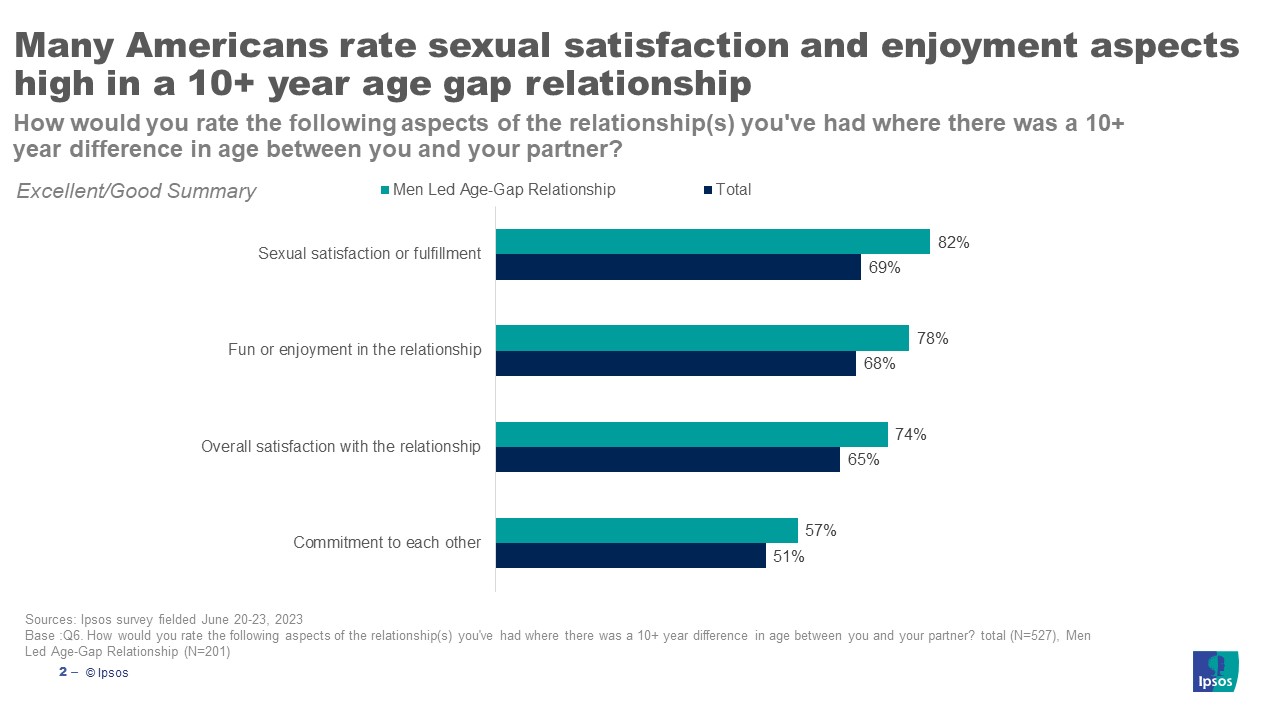Half of Americans say they have been in a 10+ year age-gap relationship
Washington DC, February 22, 2024 -- A new Ipsos poll conducted on behalf of Cougar Life finds that many American adults have engaged in relationships with age-gap of 10+ years — where physical attractiveness and sexual energy are top perceived benefits of dating or marrying someone young whereas emotional maturity and financial freedom are the top perceived benefits of dating or marrying someone older. For those who have been in 10+ years of age-gap relationships, most report positive experiences when it comes to sexual satisfaction, fun or enjoyment in the relationship, and an overall positive experience.
Detailed Findings
1. A majority of Americans see more benefits to 10+ years of age-gap dating or marrying than challenges.
- Physical attractiveness (46%) and their sexual energy or stamina (39%) are the top perceived benefits of dating or marrying someone 10+ years younger.
- Men are more likely than women (58% vs. 36%) to list physical attractiveness as a benefit of dating or marrying someone younger.
- About half (49%) of the Americans ages 35-54 are more likely compared to 55+ (47%) and 18-34 (43%) to list physical attractiveness as a benefit of dating or marrying someone younger
- Emotional maturity (59%) and financial freedom (47%) are the top perceived benefits of dating or marrying someone 10+ years older.
- Men and women (both 59%) are most likely to consider emotional maturity as a benefit of dating or marrying someone older
- Fifty percent of Americans ages 18-34 are more likely to consider professional success as a benefit of dating or marrying older, verses 41% of those ages 35-54 and 35% of those ages 55+.
2. Americans cite not having anything in common (26%) as the top perceived barrier to 10+ years age difference dating or marrying. However, of the potential barriers asked about, nearly half (48%) said none of the above.
- Concerns over what others will think decrease with age. Nearly a quarter (23%) of Americans ages 18-34 are afraid of what people might think of them if they engaged in age-gap dating, versus 12% of those ages 35-54 and 7% of those ages 55+.
- One in three (24%) of Americans ages 18-34 are more likely to think that such partner would not fit in with their friends and family. Moreover, twenty-three percent say that they don’t think they would be attracted to someone with a 10+ year(s) of age gap


3. Among women who have dated younger men and men who have dated older women, rate sexual satisfaction or fulfillment (69%) and fun or enjoyment in the relationship (68%) aspects as good to excellent.
- About eight in ten (79%) men vs women (57%) are more likely to rate good to excellent for the sexual satisfaction or fulfillment aspect.
- While describing the relationship where there was 10+ years of age gap, half (50%) of the Americans said that the older partner paid for experiences (e.g., restaurant tabs, dates, vacations, etc.) vs 44% of those who shared equally, and only 6% of those who said younger partner
- Initiates sex or intimacy factor is shared equally (59%) compared to the older partner (22%) and the younger partner (19%) while describing the relationship where there was 10+ years of age gap
4. Americans who have had relations with 10+ years age gap are more likely to rate good to excellent physical and sexual connections
- Seventy six percent of men vs women (74%) who rate good to excellent physically (e.g. physical appearance) with their partner
- Eight in ten (80%) Americans ages 35-54 are more likely to rate good to excellent towards physically (e.g. physical appearance) factor followed by ages 55+ (77%) and ages 18-34 (65%).
- About eight in ten (83%) of those who have had relationships with 10+ years age difference agrees and mostly report positive experiences when it comes to expressing their needs and desires to the partner, being themselves, and highly trust partner's intentions for them
About the Study
These are the findings of an Ipsos poll conducted between June 20-23, 2023. For this survey, a sample of 1,210 adults and oversample of 201 Men that have dated women 10+ years younger than them and 207 Women that have dated men 10+ years older than them, age 18+ from the continental U.S., Alaska, and Hawaii was interviewed online in English.
The sample for this study was randomly drawn from Ipsos’ online panel (see link for more info on “Access Panels and Recruitment”), partner online panel sources, and “river” sampling (see link for more info on the Ipsos “Ampario Overview” sample method) and does not rely on a population frame in the traditional sense. Ipsos uses fixed sample targets, unique to each study, in drawing a sample. After a sample has been obtained from the Ipsos panel, Ipsos calibrates respondent characteristics to be representative of the U.S. Population using standard procedures such as raking-ratio adjustments. The source of these population targets is U.S. Census 2019 American Community Survey data. The sample drawn for this study reflects fixed sample targets on demographics. Posthoc weights were made to the population characteristics on gender, age, race/ethnicity, region, and education.
Statistical margins of error are not applicable to online non-probability polls. All sample surveys and polls may be subject to other sources of error, including, but not limited to coverage error and measurement error. Where figures do not sum to 100, this is due to the effects of rounding. The precision of Ipsos online polls is measured using a credibility interval. In this case, the poll has a credibility interval of plus or minus 3.5 percentage points for all respondents. Ipsos calculates a design effect (DEFF) for each study based on the variation of the weights, following the formula of Kish (1965). This study had a credibility interval adjusted for design effect of the following (N=1,210, DEFF=1.5, adjusted Confidence Interval=+/- 3.5 percentage points).
For more information on this news release, please contact:
Mallory Newall
Vice President, US
Public Affairs
+1 202 374 2613
About Ipsos
Ipsos is one of the largest market research and polling companies globally, operating in 90 markets and employing over 18,000 people.
Our passionately curious research professionals, analysts and scientists have built unique multi-specialist capabilities that provide true understanding and powerful insights into the actions, opinions and motivations of citizens, consumers, patients, customers or employees. Our 75 solutions are based on primary data from our surveys, social media monitoring, and qualitative or observational techniques.
Our tagline "Game Changers" sums up our ambition to help our 5,000 customers move confidently through a rapidly changing world.
Founded in France in 1975, Ipsos has been listed on the Euronext Paris since July 1, 1999. The company is part of the SBF 120 and Mid-60 indices and is eligible for the Deferred Settlement Service (SRD).ISIN code FR0000073298, Reuters ISOS.PA, Bloomberg IPS:FP www.ipsos.com



